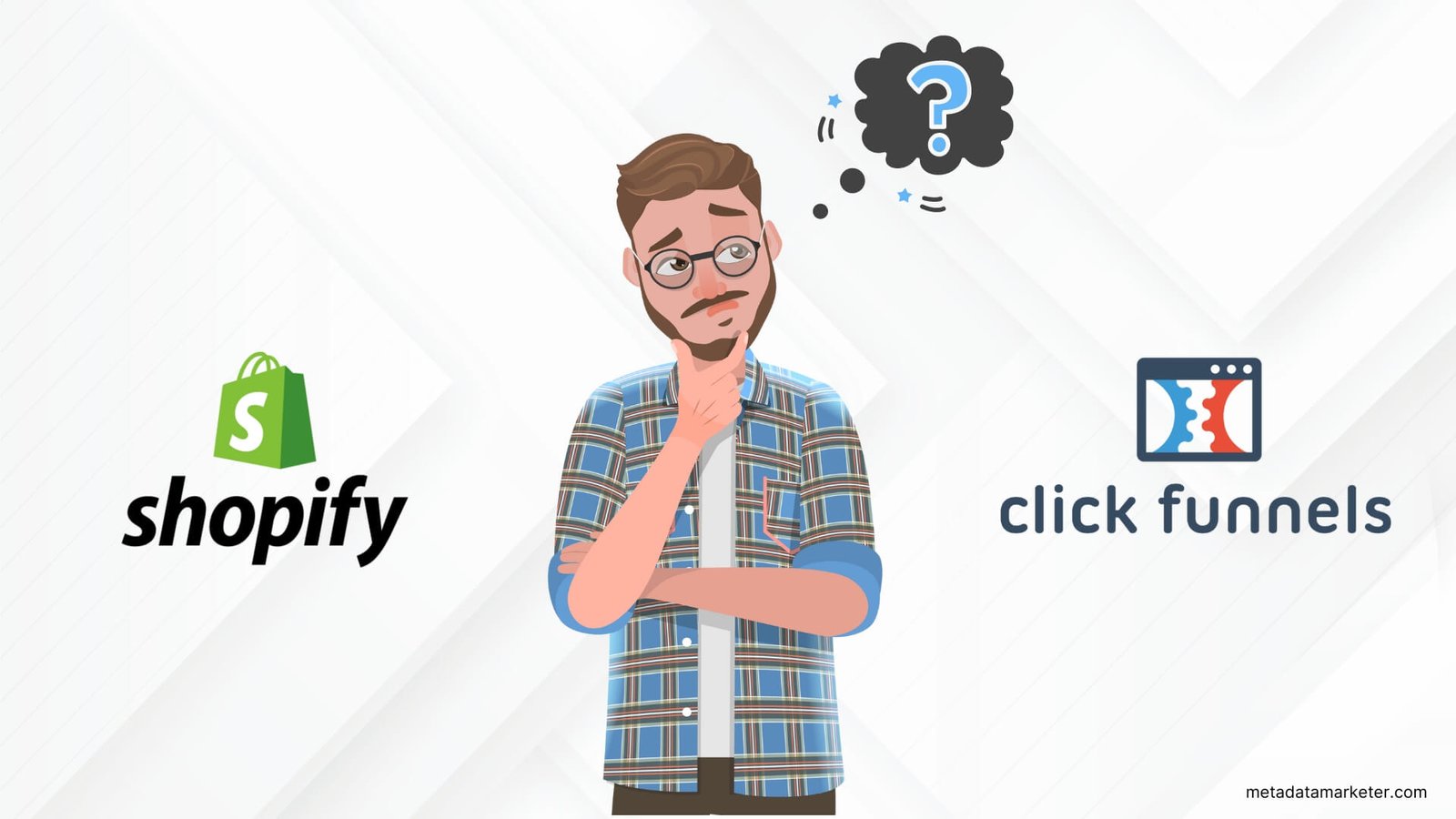When it comes to launching or growing your online business, choosing the right platform can feel like navigating a maze. You’re here because you’re weighing Shopify vs Clickfunnels — two giants in the e-commerce world. It’s a decision that can shape your business’s future, and I get it; I’ve been there. As someone who’s used both platforms, I know the ins and outs and the decisions that keep you up at night.
Shopify, the go-to for setting up an online store, and Clickfunnels, a powerhouse for sales funnels, each have their champions. But which one is right for you? It’s not just about features; it’s about finding a platform that resonates with your unique business needs.
In this article, we’ll dive deep, comparing these platforms side-by-side. Think of this as your map through the maze, highlighting features, pricing, and real-world applications. Whether you’re about to launch your first product or looking to scale up, we’ve got you covered.
Get ready to explore the Shopify vs Clickfunnels comparison. Are you prepared to find the best option for your business? Let’s begin.
Key Takeaways: Shopify vs Clickfunnels
| Aspect | Shopify | Clickfunnels |
|---|---|---|
| Focus | Comprehensive online store creation and management | Targeted sales funnels for lead generation and conversion |
| Best For | Businesses with a wide range of physical products and a need for extensive e-commerce features | Digital products/services businesses focused on marketing and high conversion rates |
| Key Features | Customizable themes, extensive app store, global payment gateways | Easy funnel creation, marketing tool integrations, lead capture efficiency |
| User Experience | Intuitive and user-friendly for store setup and management | Streamlined and efficient for creating and managing marketing funnels |
| Pricing | Budget-friendly with scalable options as business grows | Tailored plans focused on marketing needs with value for money |
| Pros and Cons | Wide range of themes, user-friendly; Limited customization without coding | Effective lead conversion, user-friendly; Less focus on traditional e-commerce features |
| Ideal for Business Type | Businesses looking to establish a detailed online presence with a variety of products | Businesses aiming for aggressive marketing and sales through streamlined funnels |
Start Your E-Commerce Journey
Affiliate Disclosure: This post contains affiliate links. For more details, visit our Affiliate Disclosure page.
Table of Contents
Overview of Shopify
Shopify: A One-Stop Shop for E-Commerce
When we compare Shopify vs Clickfunnels, Shopify stands out as a full-fledged e-commerce platform. From my journey with Shopify, I realized it’s more than just a platform to sell products; it’s a comprehensive solution that caters to various business needs.
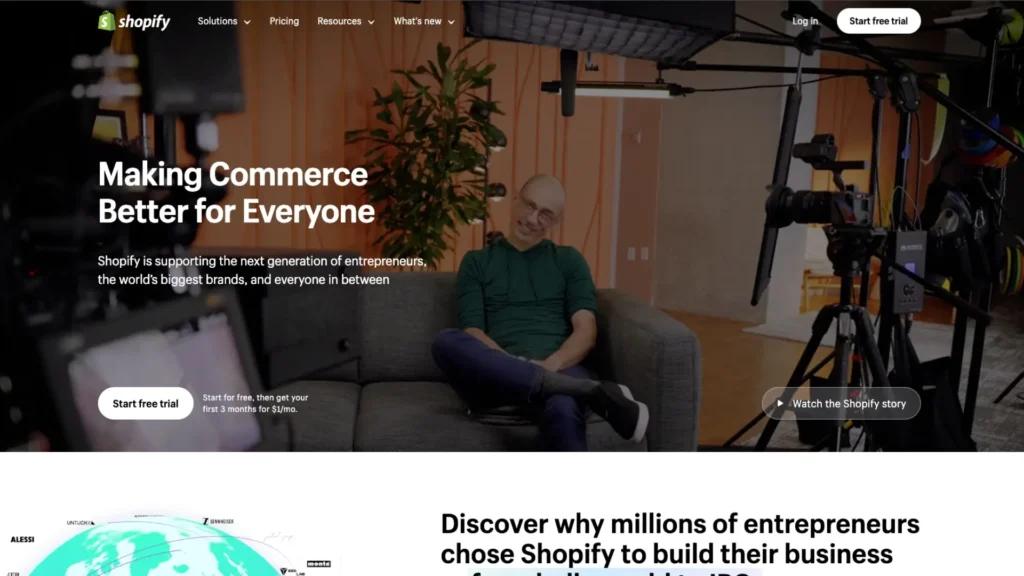
Key Features of Shopify
- E-Commerce Centricity: Shopify focuses on providing a complete online store experience. Its intuitive interface makes setting up a shop a breeze, even for beginners.
- Theme Variety: The platform offers a wide range of customizable themes, fitting different brand aesthetics and functionalities.
- App Integrations: With Shopify’s extensive app store, you can add numerous features to your store, from SEO tools to advanced analytics.
Shopify Pricing
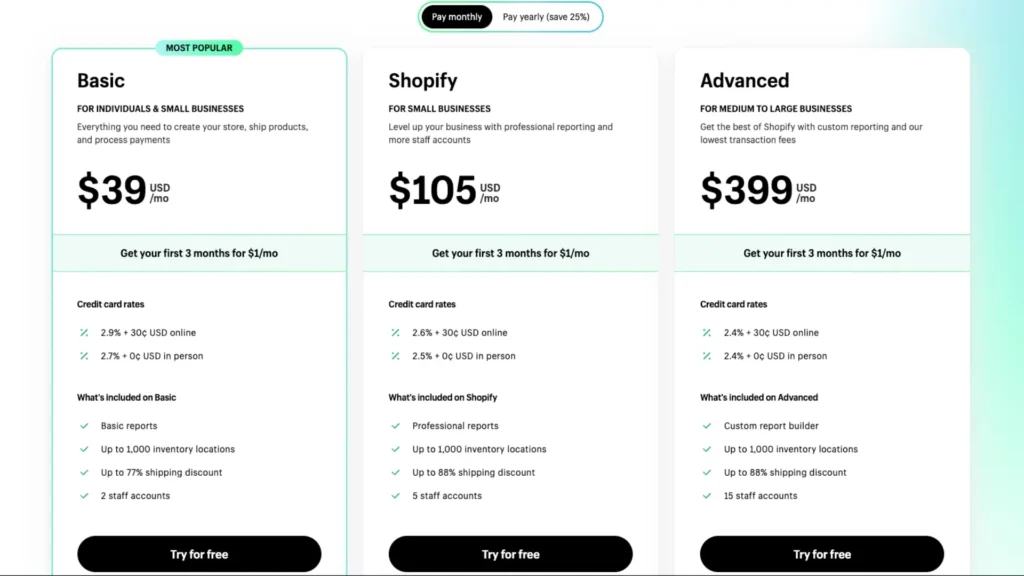
- Affordability: Shopify’s pricing plans are designed to accommodate businesses of all sizes, making it a budget-friendly option for startups.
- Scalability: As your business grows, Shopify scales with you, offering more advanced plans with additional features.
Pros and Cons of Shopify
- Pros: User-friendly, wide range of themes, extensive app integrations.
- Cons: Limited customization without coding, transaction fees on certain plans.
Shopify serves as an ideal launchpad for businesses focusing on physical products and comprehensive store management. While exploring Shopify vs Clickfunnels, it becomes clear that Shopify excels in building a customer-centric online store with a range of products.
Ready to Launch Your Online Store?
Overview of Clickfunnels
Clickfunnels: More Than Just Sales Funnels
In our Shopify vs Clickfunnels comparison, Clickfunnels stands out as a marketing and sales funnel specialist. My time using Clickfunnels taught me how good it is at turning potential customers into actual buyers.
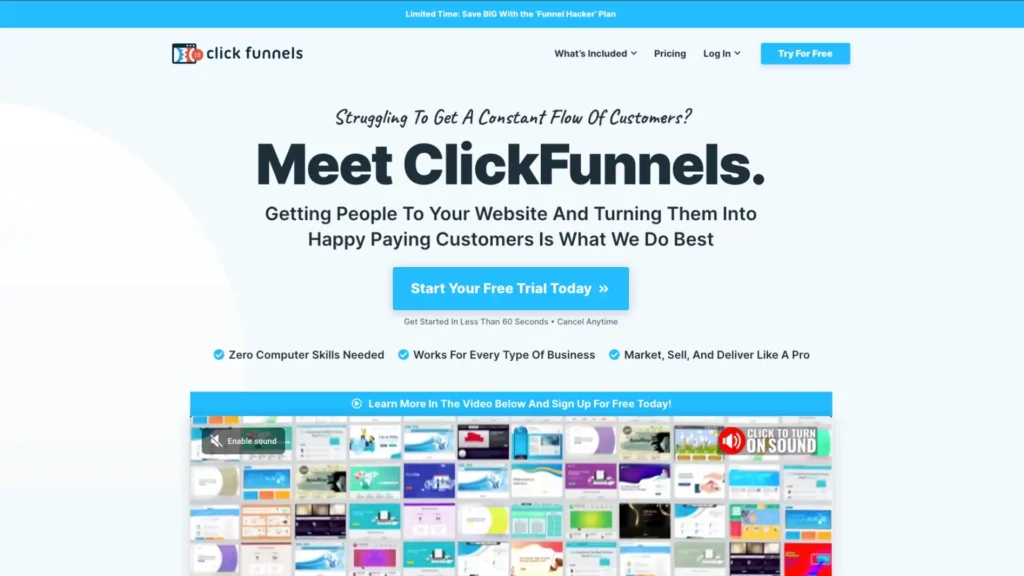
Key Features of Clickfunnels
- Sales Funnel Focus: Clickfunnels is designed to optimize the sales process from start to finish.
- Marketing Tools Integration: It seamlessly integrates with email marketing tools and analytics, enhancing campaign effectiveness.
- Ease of Use: Building funnels is straightforward, even for those new to digital marketing.
Clickfunnels Pricing
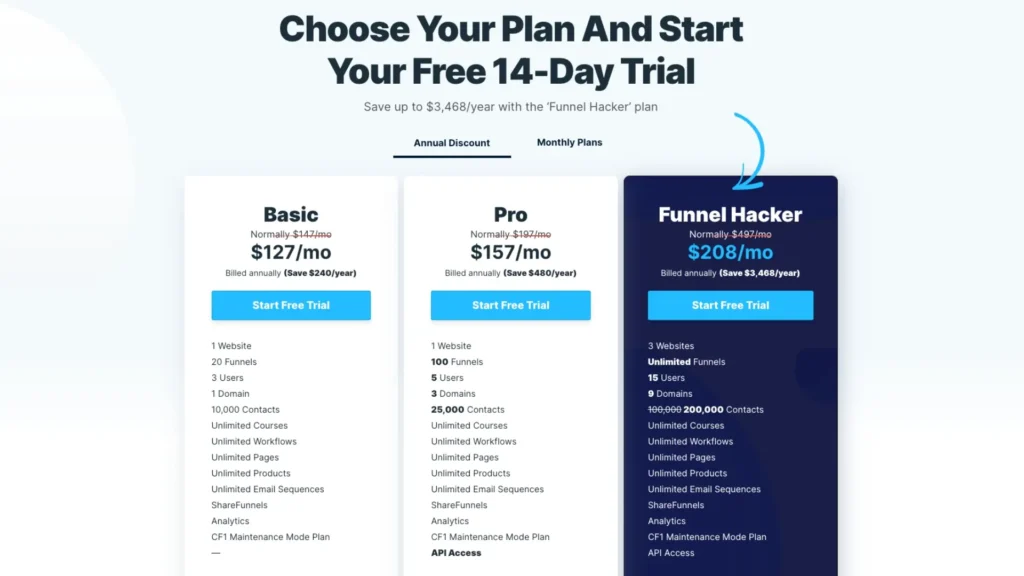
- Tailored Plans: Clickfunnels offers plans that cater to different business sizes, focusing on marketing needs.
- Value for Money: Each plan is structured to provide the best value for your specific marketing strategies.
Pros and Cons of Clickfunnels
- Pros: Effective for lead conversion, user-friendly interface, strong focus on sales funnels.
- Cons: Less emphasis on traditional e-commerce features, which might limit some online stores.
Clickfunnels excels in creating targeted marketing campaigns and converting leads into sales, making it a strong contender in the Shopify vs Clickfunnels debate, especially for businesses focusing on digital products or lead generation.
Boost Your Sales Funnel Today
Comparative Analysis – Shopify vs Clickfunnels
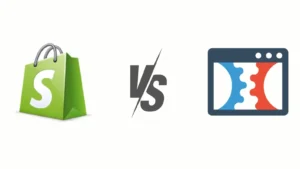
Understanding Your Needs: Choosing the Right Tool
When deciding between Shopify and Clickfunnels, understanding your specific business needs is crucial. Each platform offers unique strengths that cater to different aspects of online business.
Shopify vs Clickfunnels: A Side-by-Side Comparison
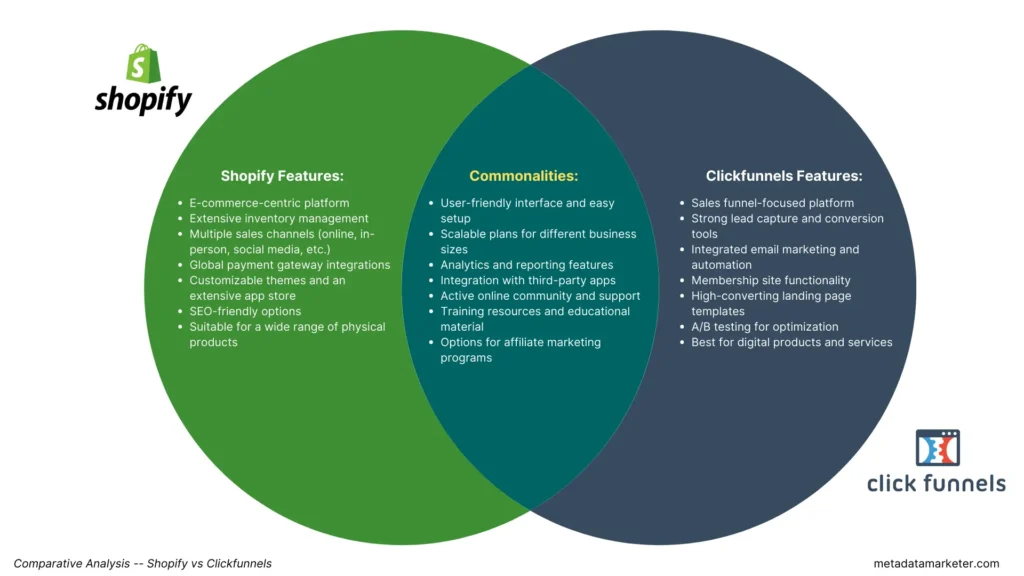
- User Experience
- Shopify offers a comprehensive and intuitive e-commerce experience.
- Clickfunnels excels in creating focused, conversion-optimized sales funnels.
- Sales and Marketing Tools
- Shopify shines with its extensive e-commerce tools and integrations.
- Clickfunnels leads in funnel building and targeted marketing campaigns.
- E-commerce and Payment Solutions
- Shopify supports a wide range of products and global payment gateways.
- Clickfunnels is more about driving sales through funnel strategies.
- SEO and Analytics
- Both platforms offer robust analytics, but Shopify has a slight edge with built-in SEO features.
- Customer Support and Community
- Shopify and Clickfunnels both provide solid support and have active user communities.
- Overall Pros and Cons
- Shopify is ideal for building a full-fledged online store.
- Clickfunnels is the go-to for creating efficient sales processes.
Balancing SEO and User Needs
In this Shopify vs Clickfunnels battle, your choice should align with your business model and growth plans. Both platforms have their merits, and the best pick depends on what you’re looking to achieve with your online presence.
Real-World Success with Shopify and Clickfunnels
Shopify Success Stories: Empowering Entrepreneurs
Shopify has been pivotal for various entrepreneurs. Here are a few highlights:
- Negative: A lingerie brand that soared with a 150% revenue increase and won awards.
- Kevin David: An internet entrepreneur who excelled in Amazon FBA and Shopify coaching, joining the 2 Comma Club.
- Allbirds: A footwear company that made a remarkable $305 million in annual revenue with sustainable practices.
Clickfunnels Success Tales: Marketing Mastery
Clickfunnels also boasts impressive successes:
- Kaelin Poulin: From scratch to a $10 million fitness empire with Lady Boss.
- Spencer Mecham: Achieved over $1 million as the top Clickfunnels affiliate.
- Garrett White: Grew Wake Up Warrior to over $30 million, leveraging Clickfunnels.
Whether it’s Shopify for e-commerce mastery or Clickfunnels for effective marketing, both platforms have propelled numerous users to remarkable success. Reflecting on these stories, it’s clear that your choice between Shopify and Clickfunnels should align with your specific business goals and the journey you envision for your enterprise.
Frequently Asked Questions
Are Clickfunnels worth it?
Clickfunnels are worth it if you want to create high-converting sales funnels and landing pages for your online business. Clickfunnels can help you increase your conversion rate, average order value, and customer lifetime value by guiding your visitors through the buying process and offering upsells, downsells, and cross-sells. Clickfunnels also provides you with various marketing tools, such as email marketing, webinars, membership sites, and affiliate programs.
Can I use Clickfunnels with Shopify?
Yes, you can use Clickfunnels with Shopify to leverage the strengths of both platforms. You can create your sales funnels and landing pages using Clickfunnels and then direct your customers to your Shopify store for checkout and fulfillment. You can also integrate Clickfunnels and Shopify using apps like Zapier, Funnel Buildr, or OneClickUpsell.
Are Clickfunnels safe?
Clickfunnels are safe to use as they comply with the industry standards for security and privacy. Clickfunnels uses SSL encryption, PCI compliance, GDPR compliance, and third-party audits to protect your data and transactions. Clickfunnels also has a transparent privacy policy and terms of service that explain how they collect, use, and share your information.
Are Shopify stores legit?
Shopify stores are legit as long as they follow the Shopify Terms of Service and Acceptable Use Policy. Shopify is a reputable e-commerce platform that hosts over 1.7 million merchants and powers over 2.5 million online stores worldwide. However, not all Shopify stores are trustworthy or reliable, as some may sell counterfeit, illegal, or low-quality products, or engage in fraudulent or deceptive practices. Therefore, you should always do your research before buying from a Shopify store, such as checking the store’s reviews, ratings, contact information, refund policy, and social media presence .
Can I use Shopify theme in WordPress?
No, you cannot use a Shopify theme in WordPress, as they are not compatible. Shopify themes are designed for Shopify stores and use a different coding language and structure than WordPress themes. WordPress themes are designed for WordPress sites and use PHP, HTML, CSS, and JavaScript. If you want to use a Shopify theme in WordPress, you will need to convert it into a WordPress theme, which can be a complex and time-consuming process. Alternatively, you can use a WordPress theme that looks similar to a Shopify theme, or use a plugin that allows you to embed your Shopify products or store into your WordPress site .
How much do ClickFunnels cost?
ClickFunnels has three pricing plans:
The Basic plan costs $127 per month (or $147 per month if billed monthly).
The Pro plan costs $157 per month (or $197 per month if billed monthly).
The Funnel Hacker plan costs $208 per month (or $297 per month if billed monthly).
There’s also a free 14-day trial available for any plan.
Can I use Shopify with Wix?
Yes, you can use Shopify with Wix by using Shopify’s buy button feature. This feature allows you to add a “buy now” button to your Wix website, which will take your customers to your Shopify checkout page. You can customize the button to match your website’s design and track your sales in your Shopify dashboard. To use this feature, you will need a Shopify account and a Wix account. You will also need to install the Shopify app on your Wix site and generate a buy button code from your Shopify dashboard. Then, you can embed the code on your Wix site using an HTML widget.
How do Shopify stores work?
Shopify stores work by providing you with everything you need to create and run an online store. You can choose from hundreds of themes, add your products, set up your payment and shipping options, and manage your orders and inventory. You can also sell on other platforms, such as social media, marketplaces, and blogs, using Shopify’s sales channels. Shopify also offers various tools to help you market your store, such as email marketing, social media integrations, and analytics. Shopify also has a mobile app that lets you manage your store on the go.
What Shopify plan should I choose?
The Shopify plan you should choose depends on your business needs and budget. The Starter plan is the cheapest option, but it does not include an online store. The Basic plan is the most affordable option that includes an online store, but it has limited features and higher transaction fees. The Shopify plan is the most popular option, as it offers more features and lower transaction fees than the Basic plan. The Advanced plan is the most expensive option, but it offers the most benefits and the lowest transaction fees. You can also consider Shopify Plus, which is an enterprise-level solution for large and growing businesses.
Final Thoughts on Shopify vs Clickfunnels
Making the Right Choice for Your Business
Choosing between Shopify and Clickfunnels isn’t just about features; it’s about aligning with your business vision and needs. Both platforms excel in their realms, but your choice depends on your unique business goals.
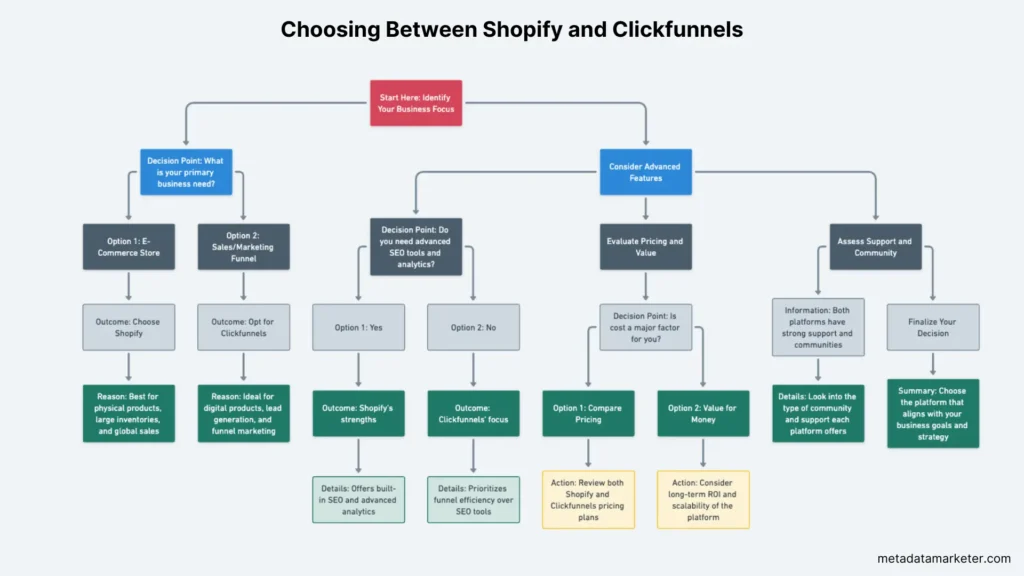
Decision Factors
- Shopify is ideal if you’re looking to build a comprehensive online store with a wide product range and global reach.
- Clickfunnels is the better option for businesses focused on digital products or services and need to generate leads and convert sales more efficiently.
Final Recommendations
Remember, there’s no one-size-fits-all in the Shopify vs Clickfunnels debate. Consider your business model, target audience, and growth plans. The right platform is the one that aligns with your strategy and helps you achieve your business objectives effectively.

